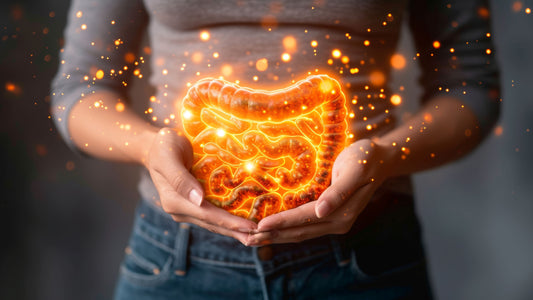What is hormonal balance? It’s a buzzword that gets thrown around a lot in women’s health these days. But what exactly is hormone balance and how do you achieve it? Is it even real? How do you know if your hormones are imbalanced? And what can you do if they are?
It’s time we had a chat about what hormone balance is, what causes it, and how it can make you feel.
Most importantly, I’m going to give you my best tips for improving what’s within your power to change when your hormones start to fall out of balance — including diet changes, supplements, and even exercises you can do to start feeling more like yourself again.
What Is Hormone Balance?
In your body, there are several pairs of hormones that “balance” each other out.
For example:
- Estrogen and progesterone
- Progesterone and testosterone
- Cortisol and oxytocin
- Insulin and glucagon
When the presence of one of the hormones in these pairs outweighs the other, we call this a “hormone imbalance.” It’s not really a traditional medical term, but more of a common way to refer to the situation at hand. And while the medical community is slowly coming around to using these words to describe what happens when levels of certain hormones drop, certain doctors will insist that “hormone imbalance isn’t real.”
This kind of rhetoric hurts women, especially menopausal women, who experience the lingering effects of hormone imbalances every single day.
I say, let’s use the words that resonate with patients…and “hormone imbalance” certainly seems to do that.
Why Is Hormonal Balance Important?
Why is hormonal balance important? Just ask any woman over the age of 35 who has experienced breakouts, headaches, nausea, heavy periods, weight gain, breast pain, high blood pressure, hot flashes, or night sweats.
Essentially, hormonal balance is important because when your hormones are imbalanced, it can seriously affect your quality of life.
You deserve to live a life full of joy and vibrant health. You are worthy of experiencing all that life has to offer, even after you near the end of your reproductive years. And keeping your hormones in balance can help you find that bliss.
Why Hormone Imbalance Occurs
There are several reasons hormone imbalance happens in the first place. The most common reason: perimenopause and menopause!
Estrogen And Progesterone Imbalance
Here’s what typically happens when your progesterone and estrogen become imbalanced:
- Your body stops producing sufficient progesterone because you’re not ovulating regularly anymore. You need ovulation to get progesterone. And you need progesterone to help balance estrogen.
- While your estrogen levels may be decreasing, your progesterone levels decrease at a faster rate, leaving you with what’s known as “estrogen dominance.”
- You start to experience all sorts of uncomfortable symptoms, from anxiety and irritability to weight gain and hot flashes. Your doctor will probably tell you this is all just “normal.”
Cortisol And Oxytocin Imbalance
Here’s another scenario that often happens when your cortisol and oxytocin become imbalanced:
- Your adrenals, which form the foundation of your hormone health, become taxed from years of stress caused by working full-time, raising children, and taking care of the house.
-
Your adrenals start pumping out cortisol, the stress hormone, instead of DHEA — which your body can use to turn into a backup source of progesterone, estrogen, and testosterone. This causes your hormones to fall out of balance even further.
- You start to gain weight, feel tired all the time, and yet you can’t get to sleep at night.
How To Check Hormone Imbalance
So, how do you know if your hormones are imbalanced? Your doctor may be able to use a blood test to see if your body has elevated levels of luteinizing hormone (LH) or follicle-stimulating hormone (LH). This typically indicates that your body is having to work a little bit harder than usual to get your ovaries to ovulate…and it’s a sign of a budding hormone imbalance.
But honestly, the most common hormone imbalance test is recognizing that you don’t feel 100% like yourself.
> Maybe you’re more tired than usual and you’re not sure why.
> Maybe you’re feeling more disconnected from your loved ones.
> Maybe you’re bloated, angry, or annoyed with just about everything.
These are the kinds of signs that something’s not right and your hormones may be falling out of balance.
What Does Hormone Imbalance Feel Like?
Hormone imbalance can feel subtle or severe. A lot of women brush off the beginning symptoms of hormone imbalance because we’re conditioned to put ourselves last and push through the pain.
But, it’s easier to get your hormones back on track in the beginning phases of perimenopause.
I’d encourage you to start investigating hormonal imbalances the minute you start to notice these hormone imbalance symptoms:
- Acne
- Fatigue
- Anxiety
- Nausea
- Brain fog
- Breast pain
- Hot flashes
- Depression
- Night sweats
- Vulvar itching
- Heavy periods
- Missing periods
- Vaginal dryness
- Heavy cramping
- Insulin resistance
- Intrusive thoughts
- Difficulty sleeping
- Your mood feels ‘flat’
- High blood pressure
- Your motivation is gone
- Headaches around ovulation or your period
- You’re gaining weight and you don’t know why
- Your cycle is changing (could be shorter or longer)
What Helps Balance Hormones Naturally — My Top Tips For Women’s Health
Ok, we’ve covered a lot of the symptoms of hormonal imbalance that start to crop up in perimenopause and menopause.
Now, it’s time to chat about ways to support hormone balance. Here are my 5 best tips for keeping your hormones as balanced as possible:
1. Move Your Body
Exercise is like a magic pill for your health and your hormones. There’s no better way to start balancing your hormones than to move your body — even if it’s just for 20 minutes a day. It doesn’t matter if you meet up with your trainer a few times a week or simply go for a jog. Just get your heart rate up, give your muscles something to resist, and watch your symptoms improve.
2. Keep Your Diet In Check
Like it or not, your diet plays an outsized role in how your body processes your hormones. Focus on adding plenty of alkalinizing green veggies into your diet and limit your processed carbs for best results. I call this way of eating Keto-Green® and it’s my signature method for putting an end to menopausal mayhem. Click here to learn more about how to eat the Keto-Green® way.
3. Try Adaptogenic Herbs
Adaptogens are a class of herbs that have been used for centuries to help your body ‘adapt’ to stress. My favorite in this category is hands-down maca root. Maca’s a powerful adrenal-loving herb that works to support your hormone balance in the best way. It’s the superstar ingredient in my Mighty Maca® Plus formula for a good reason!
4. Sleep Is Non-negotiable
Doctor’s orders: it's time to make sure you’re sleeping for 7-9 hours a night. Getting plenty of rest can help balance all sorts of hormones and even help you lose weight. Turn off those devices at night, get into bed early, and be sure to sleep in a completely dark room. If you need a little extra help in the sleep department, be sure to check out my Nite ZZZ caps here.
5. Reduce Stress Anywhere You Can
Stress is bad for your hormones — because it really targets your fragile adrenals. And your adrenals are the cornerstone of your hormone health. Plus, stress is bad for your heart health, too. I know it can be easier said than done to just “reduce stress” but try incorporating a few minutes of journaling or meditation into your day to start. And remember, most of the things you’re worried about now you won’t even remember in a year. Just relax and learn to let go.
What Is Hormonal Balance? Final Thoughts
I know a lot of women think they can just wait for their hormones to balance after menopause. But while things will eventually even out once your body gets used to its new normal, perimenopause can start as early as age 35!
With the average age of menopause clocking in at 51 and some women continuing to experience these hormone imbalance symptoms for years after their period ends…that’s a very long time to live a life compromised by hormone imbalance. You are worthy of so much more than that.
You were designed to live a life full of abundant joy and radiant health — don’t be afraid to claim it.



